What Is Leptospirosis in Dogs?
Leptospirosis in dogs (often referred to as “lepto”) is a disease caused by Leptospira bacteria. Found all over the world in water and soil, there are many strains of this type of bacteria that can lead to infection. Leptospirosis can pass between animals and humans, making it a zoonotic disease. Wildlife such as rodents, deer, wolves, skunks, and raccoons can all potentially carry and spread the disease. Leptospirosis is a serious infection that spreads through the dog’s bloodstream and could be life-threatening.
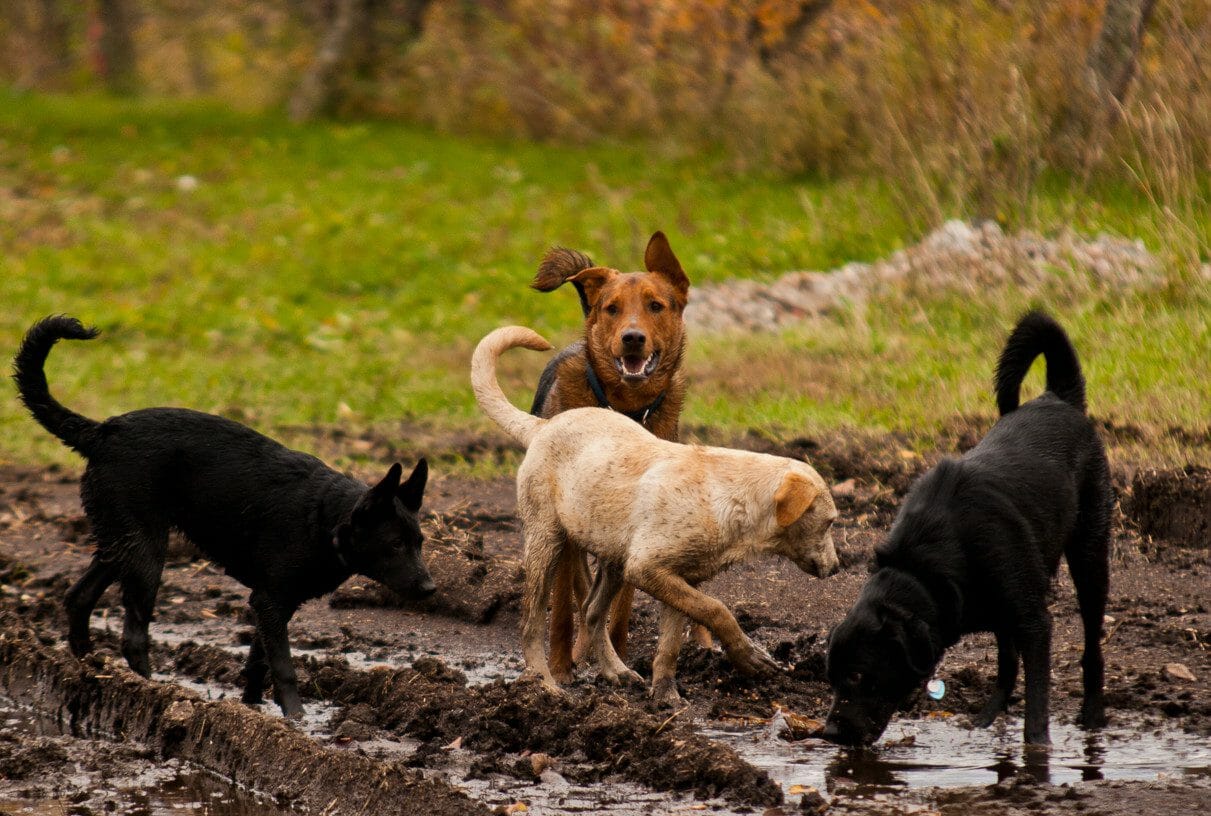
How Do Dogs Get Leptospirosis?
The most common time of year for a dog to be infected with leptospirosis is during the fall. The disease is most often found in tropical, subtropical, and wet areas. Dogs make pick up the bacteria in:
- Muddy areas
- Areas with stagnant water
- Puddles
- Irrigated pastures
If infected wildlife urinate in these areas, the risk of infection increases. This is because the urine can pass into open sores or be consumed in infected water. Dogs that sniff the urine of such animals may also be at risk of contracting the disease.
Certain situations and living conditions place dogs at an elevated risk of canine leptospirosis:
- Dogs living on farms
- Pets that have been in boarding kennels
- Canines that live near woods
- Sporting and hunting dogs
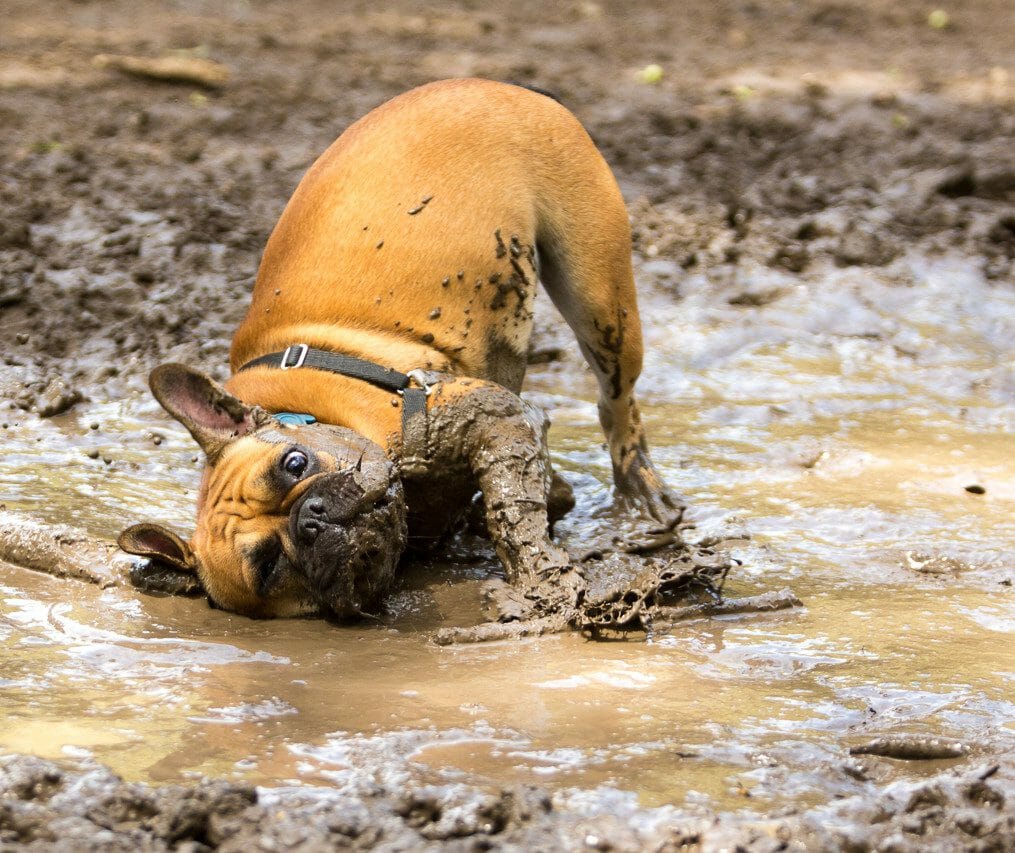
Leptospirosis in Dogs Symptoms
Signs of leptospirosis in dogs include:
- Soreness in the muscles, which prompts a lack of movement
- Fever and shivering
- Stiffness in joints and difficulty moving
- Depression and lethargy
- Weakness
- Increase in thirst
- Increased urination
- Difficulty urinating (caused by kidney failure)
- Loss of appetite
- Vomiting (with or without blood)
- Diarrhea (with or without blood)
- Deep red gums
- Cough
- Runny nose
- Labored breathing
- Swollen lymph nodes
- Jaundice
- Mouth ulcers
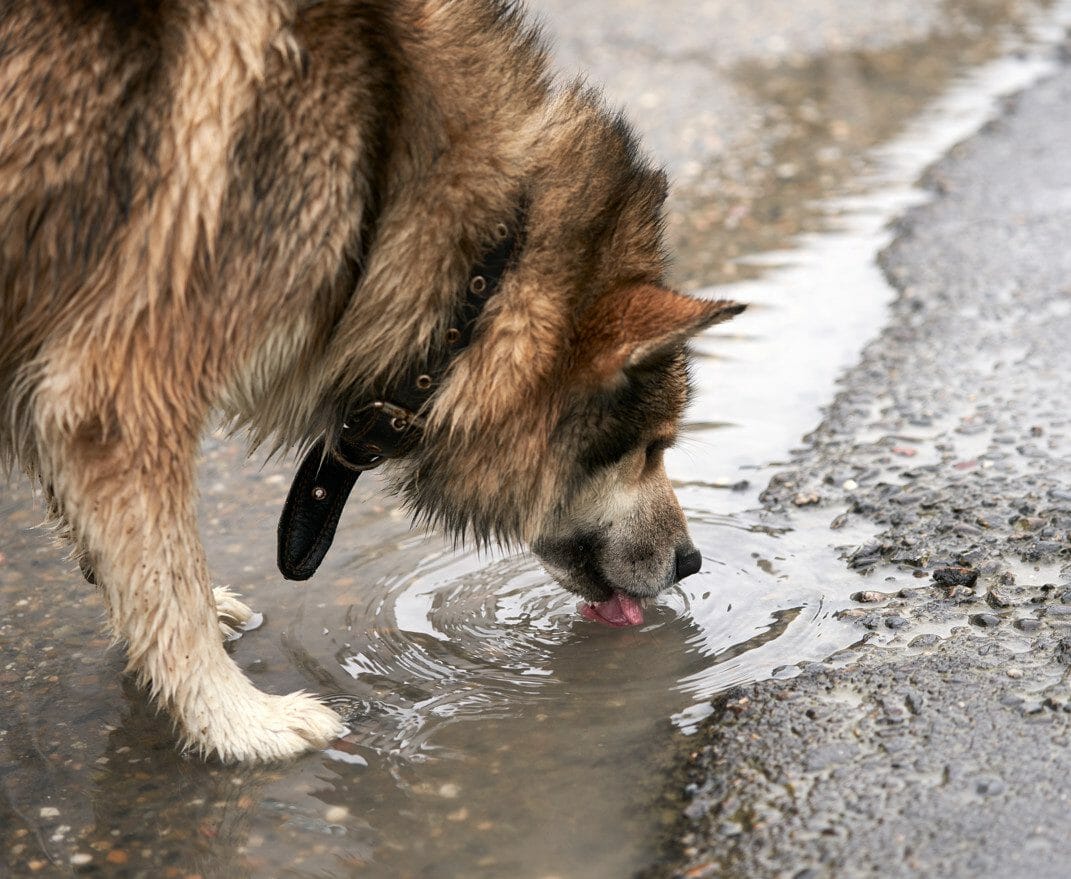
Stages of Leptospirosis in Dogs
A leptospirosis infection spreads through the body as the bacteria reproduces in the dog’s kidneys, liver, reproductive system, eyes, and nervous system. In the early stages of infection, a fever emerges along with a bacterial infection in the blood. As the immune system creates antibodies, these symptoms will subside.
Even if the infection is fully eradicated, leptospira spirochetes may remain and replicate in the dog’s kidneys. If the kidney or liver is infected, the disease could be fatal. Animals with weakened or underdeveloped immune systems will be at an increased risk of life-threatening complications.
Leptospirosis Diagnosis
When any of the symptoms of leptospirosis are identified, it is essential to consult a veterinarian. To diagnose the condition, be prepared to provide details about:
- Overall history of the dog’s health
- When the symptoms started
- Incidents that might have caused the infection
This information may help the veterinarian assess how far the infection has progressed and determine which organs may be affected.
The following tests may be used to complete the diagnosis:
- Blood count
- Blood profile
- Electrolyte panel
- Urine test
Blood and urine cultures will be used to assess how prevalent the bacteria are, how the dog’s immune system has responded to it, and the spread of antibodies.
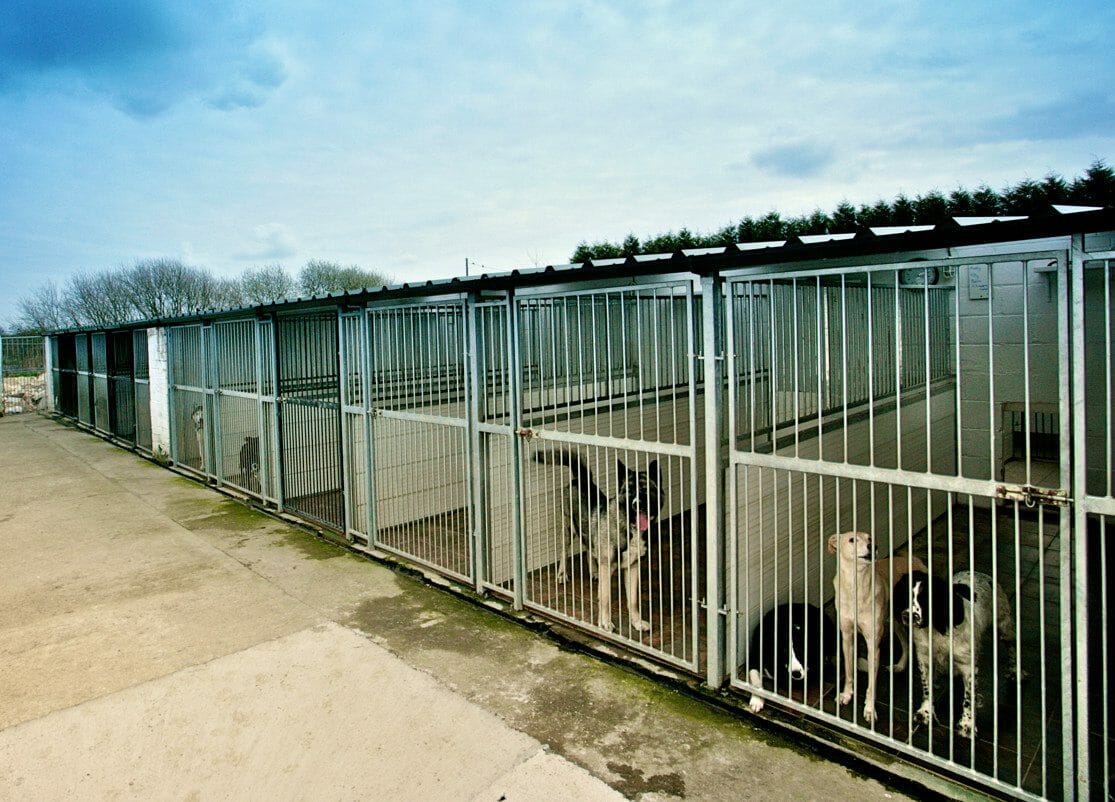
Leptospirosis Treatment
The main treatment for leptospirosis is antibiotics. The type of antibiotic prescribed will depend on how far the disease has progressed. At the start of the infection, penicillin may be used. However, this type of drug is not effective once the carrier stage is reached. As the disease progresses, antibiotics such as fluoroquinolones and tetracyclines may be used.
In acute cases of leptospirosis, the dog will need to be hospitalized. In the beginning, fluid therapy will be used to combat dehydration. An antiemetic drug will also be administered to prevent vomiting. To help feed a dog that has been persistently vomiting, a gastric tube may be used. If severe hemorrhaging has taken place, the dog may need a blood transfusion.
How to Treat Leptospirosis in Dogs at Home
If dogs exhibit any sign of leptospirosis, veterinarian assistance should be sought. Any animal with this condition should be treated in complete isolation because there is a high risk of the disease spreading to people and other pets within the home.
The disease can be physically draining, and dogs will need complete rest. Make sure plenty of fresh water is always available to ward off dehydration. Whenever possible, encourage the dog to urinate away from any standing water or any areas where other animals go.
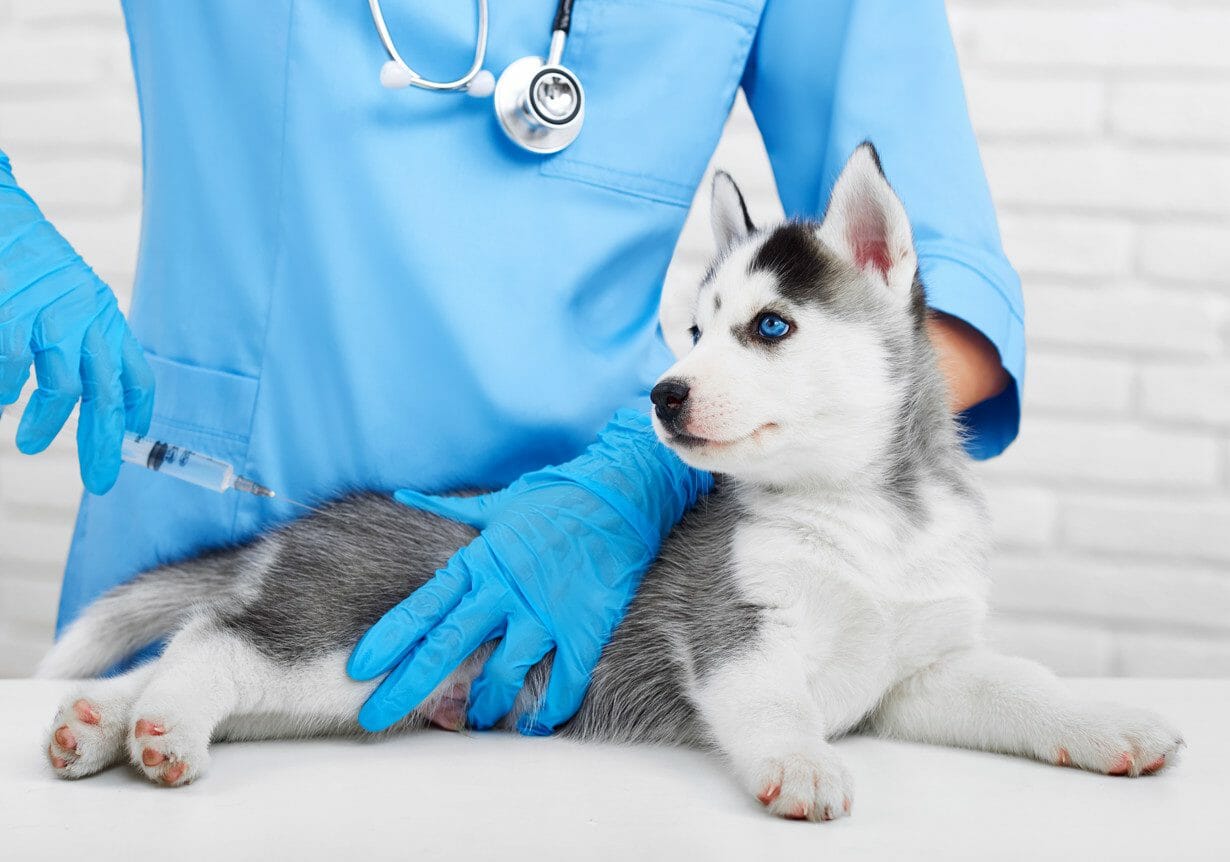
How to Prevent Leptospirosis in Dogs
Care should be taken to ensure unvaccinated animals are not exposed to situations where they could be potentially infected (as described earlier). When out in public, keep the dog from exploring areas where there is stagnant water, mud, or urine from unvaccinated animals. When using a boarding kennel, carry out thorough research to ensure the facility is clean and free from rodent droppings. (Another concern when boarding a dog is kennel cough.)
Leptospirosis Vaccine
The best way to prevent leptospirosis is to vaccinate the dog. Although the vaccination only covers certain strains of bacteria and is not 100% effective, it will greatly reduce the risk of infection. The vaccine should be administered when the puppy is between 8 to 12 weeks old. Regular boosters will help maintain immunity.
Leptospirosis in Dogs Prognosis
Provided aggressive treatment is administered, the prognosis for the disease is good. If the appropriate therapy is not given promptly, there is a risk of chronic renal and kidney damage as well as pulmonary hemorrhage syndrome. The results of these conditions can be fatal.
Leptospirosis in Humans
In humans, a leptospirosis infection causes symptoms similar to the flu. Most cases of the disease typically occur following recreational activity in water. Infection from contact with dogs occurs less frequently. However, it is still possible. Although the bacteria can be found anywhere, the disease is more common in warmer climates that have high rainfall.
Owners of infected dogs should use latex gloves and wear face masks while caring for their pets. Waste from the animal (such as urine, vomit, and diarrhea) should be thoroughly cleaned and disinfected immediately. Carefully dispose of any waste and make sure to thoroughly wash hands after handling the canine.
People that have issues with their immune system, HIV, or cancer should consult their doctor if they exhibit any of the signs and symptoms of leptospirosis.



